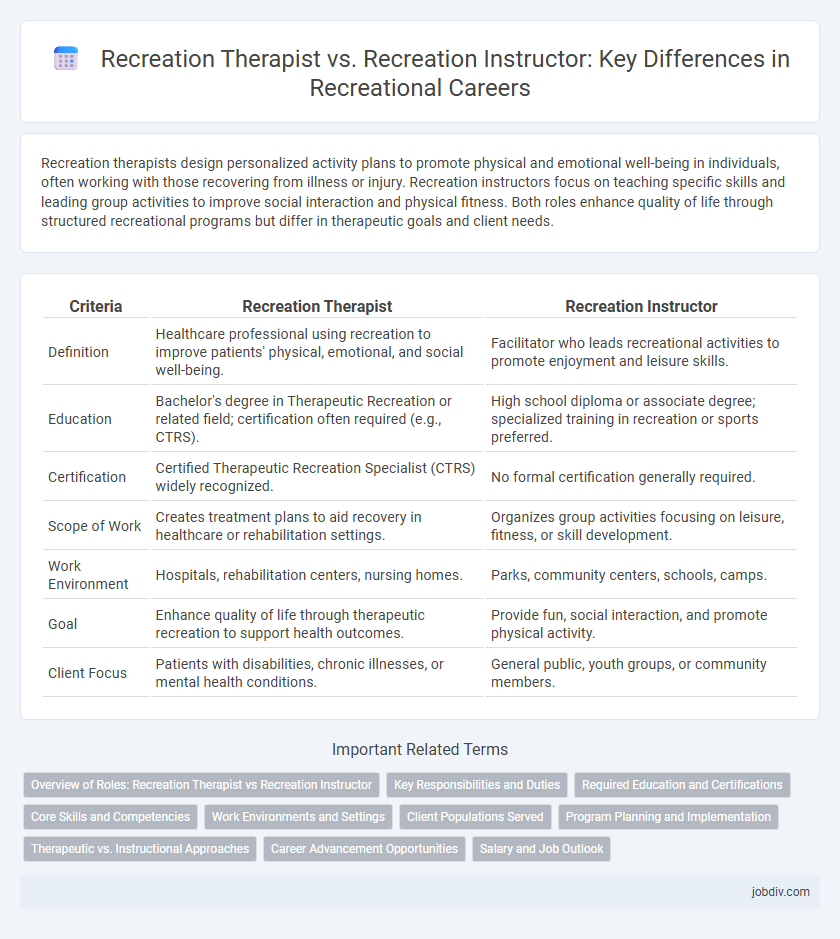Recreation therapists design personalized activity plans to promote physical and emotional well-being in individuals, often working with those recovering from illness or injury. Recreation instructors focus on teaching specific skills and leading group activities to improve social interaction and physical fitness. Both roles enhance quality of life through structured recreational programs but differ in therapeutic goals and client needs.
Table of Comparison
| Criteria | Recreation Therapist | Recreation Instructor |
|---|---|---|
| Definition | Healthcare professional using recreation to improve patients' physical, emotional, and social well-being. | Facilitator who leads recreational activities to promote enjoyment and leisure skills. |
| Education | Bachelor's degree in Therapeutic Recreation or related field; certification often required (e.g., CTRS). | High school diploma or associate degree; specialized training in recreation or sports preferred. |
| Certification | Certified Therapeutic Recreation Specialist (CTRS) widely recognized. | No formal certification generally required. |
| Scope of Work | Creates treatment plans to aid recovery in healthcare or rehabilitation settings. | Organizes group activities focusing on leisure, fitness, or skill development. |
| Work Environment | Hospitals, rehabilitation centers, nursing homes. | Parks, community centers, schools, camps. |
| Goal | Enhance quality of life through therapeutic recreation to support health outcomes. | Provide fun, social interaction, and promote physical activity. |
| Client Focus | Patients with disabilities, chronic illnesses, or mental health conditions. | General public, youth groups, or community members. |
Overview of Roles: Recreation Therapist vs Recreation Instructor
Recreation Therapists utilize evidence-based therapeutic techniques to improve clients' physical, emotional, and social well-being, often working with individuals with disabilities or chronic illnesses in clinical settings. Recreation Instructors primarily focus on teaching recreational activities and skills to diverse groups, promoting leisure engagement and physical fitness in community centers, schools, or camps. While both roles encourage active participation and social interaction, therapists emphasize treatment goals, whereas instructors concentrate on skill development and enjoyment.
Key Responsibilities and Duties
Recreation therapists design and implement therapeutic activities tailored to individuals with disabilities or illnesses to improve physical, emotional, and social well-being, often collaborating with healthcare professionals and monitoring patient progress. Recreation instructors primarily teach skills and guide groups or individuals in leisure activities such as sports, arts, or fitness programs, focusing on participation and enjoyment rather than clinical outcomes. Both roles require strong communication skills, but therapists emphasize individualized treatment plans while instructors concentrate on skill development and group engagement.
Required Education and Certifications
Recreation therapists typically require a bachelor's degree in therapeutic recreation or a related field and must obtain certification such as the Certified Therapeutic Recreation Specialist (CTRS) credential to practice professionally. Recreation instructors often hold a high school diploma or associate degree, with certifications varying by specialization, including first aid or lifeguard training. Both roles emphasize specialized education and certifications to ensure effective delivery of therapeutic or instructional recreational activities.
Core Skills and Competencies
Recreation Therapists possess specialized skills in therapeutic techniques and patient assessment, focusing on improving clients' physical and mental well-being through tailored activity plans. Recreation Instructors emphasize group facilitation, activity planning, and instructional skills to engage participants in leisure activities that promote social interaction and physical fitness. Both roles require strong communication, creativity, and organizational abilities but differ in therapeutic knowledge and clinical application.
Work Environments and Settings
Recreation therapists primarily work in healthcare settings such as hospitals, rehabilitation centers, and long-term care facilities, using therapeutic activities to improve patients' physical and emotional well-being. Recreation instructors are commonly found in community centers, parks, schools, and recreational facilities, where they organize and lead group activities for general leisure and skill development. Both professionals engage with diverse populations but differ in their focus, with therapists emphasizing clinical outcomes and instructors prioritizing recreational enjoyment.
Client Populations Served
Recreation Therapists specialize in serving clients with physical, emotional, or cognitive disabilities, utilizing therapeutic recreational activities to improve their health and quality of life. Recreation Instructors generally work with broader populations, including children, adults, and seniors, focusing on skill development and leisure engagement through organized recreational programs. Both professionals tailor activities to meet the specific needs of their client populations, but Recreation Therapists emphasize clinical outcomes while Recreation Instructors promote general wellness and social interaction.
Program Planning and Implementation
Recreation therapists design and implement therapeutic programs tailored to individuals with specific physical, emotional, or cognitive needs, using evidence-based techniques to improve patient health outcomes. Recreation instructors focus on planning and leading general recreational activities aimed at promoting leisure skills and social interaction within community or organizational settings. Both roles require program planning and implementation skills, but recreation therapists integrate clinical goals while instructors emphasize engagement and skill development.
Therapeutic vs. Instructional Approaches
Recreation therapists utilize evidence-based therapeutic approaches to improve patients' physical, emotional, and social well-being through tailored activities that support rehabilitation goals. Recreation instructors focus on teaching recreational skills, sports techniques, and group activities designed to enhance enjoyment, social interaction, and fitness without a clinical therapeutic framework. The key distinction lies in the recreation therapist's goal of treatment and recovery, while the recreation instructor emphasizes skill development and leisure participation.
Career Advancement Opportunities
Recreation therapists often have more advanced career advancement opportunities due to their specialized training in therapeutic techniques and certifications, enabling them to work in clinical settings such as hospitals and rehabilitation centers. Recreation instructors typically advance within community centers or recreational facilities, focusing on program leadership and administrative roles. Pursuing certifications like the Certified Therapeutic Recreation Specialist (CTRS) can significantly enhance career prospects for recreation therapists.
Salary and Job Outlook
Recreation therapists typically earn a median annual salary of around $48,000, with job growth projected at 14%, reflecting strong demand in healthcare settings. Recreation instructors usually have a lower median salary near $30,000 but benefit from steady job opportunities in community centers and educational institutions. Both professions contribute to wellness and leisure but differ significantly in income potential and employment growth rates.
Recreation Therapist vs Recreation Instructor Infographic

 jobdiv.com
jobdiv.com